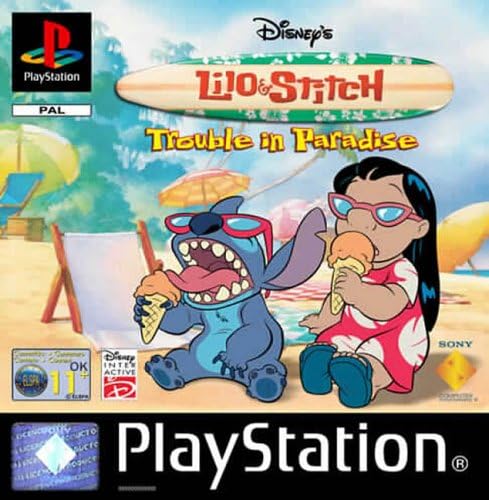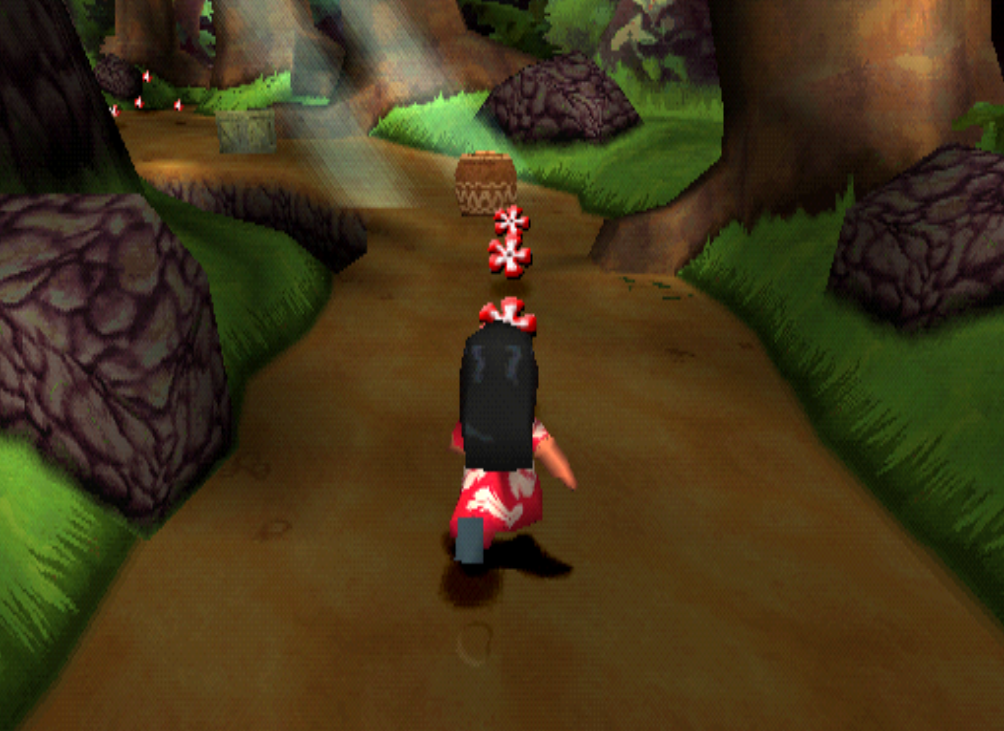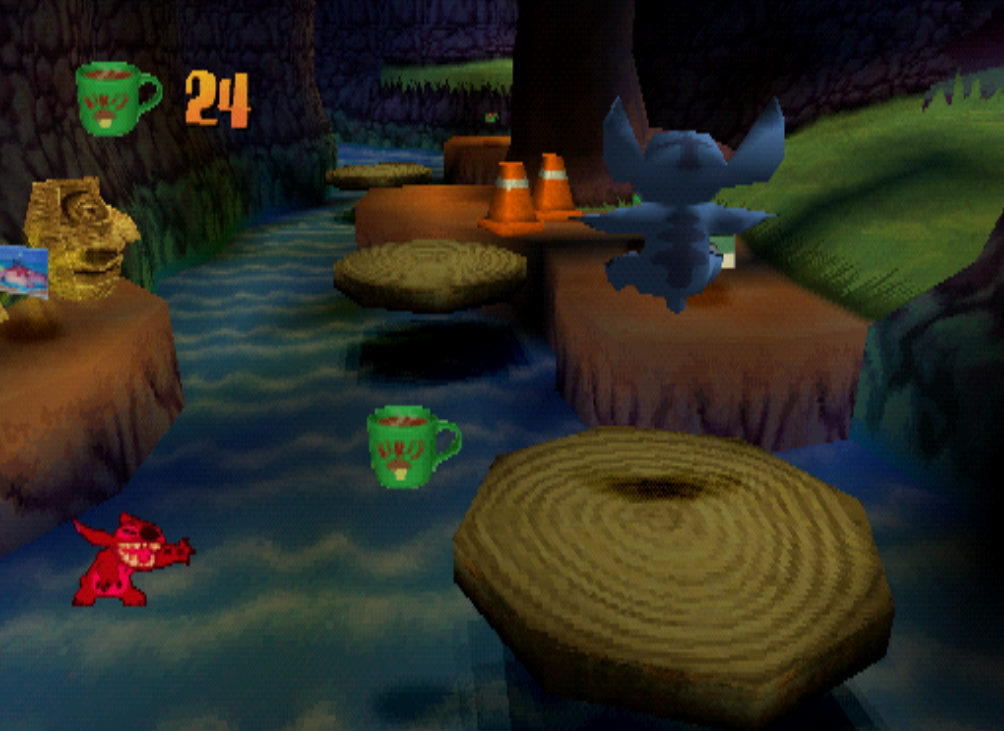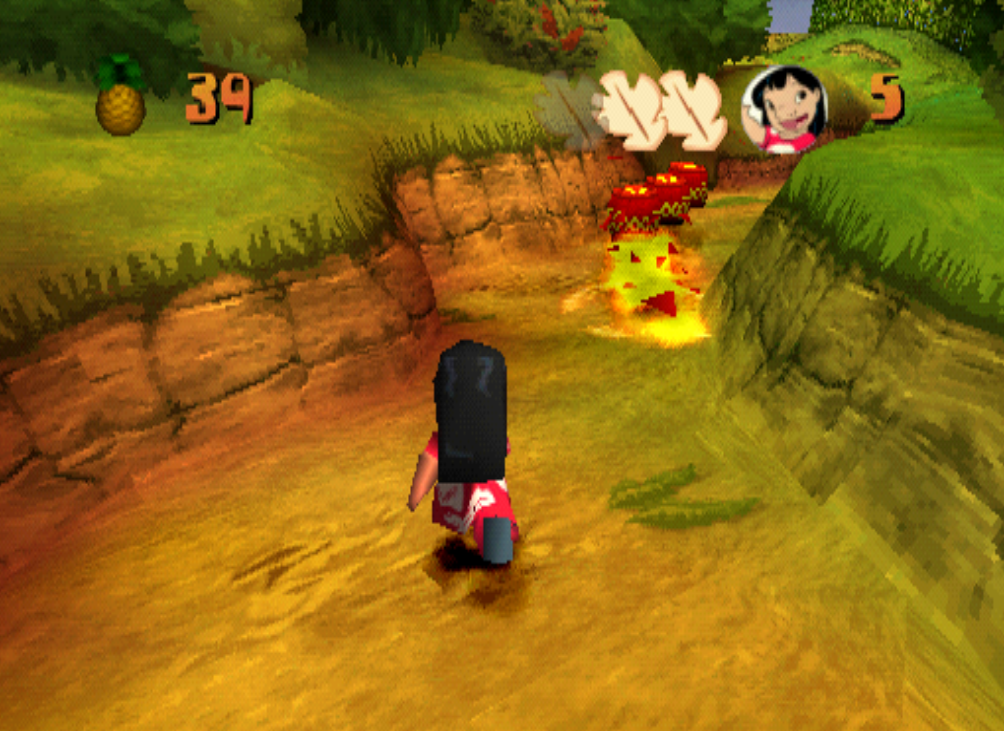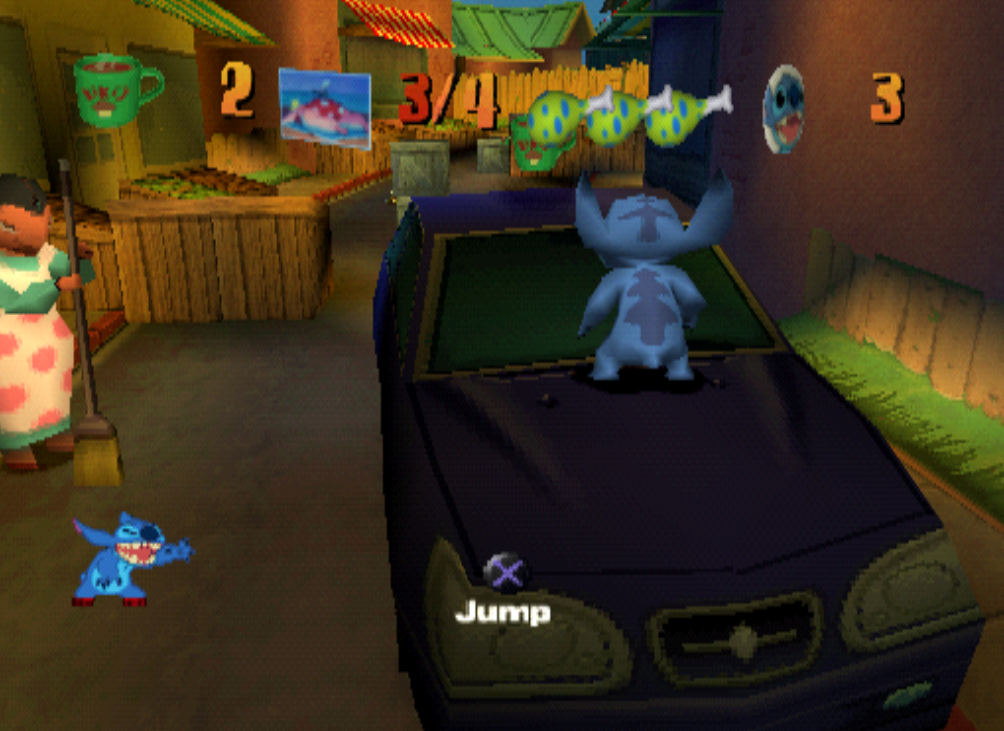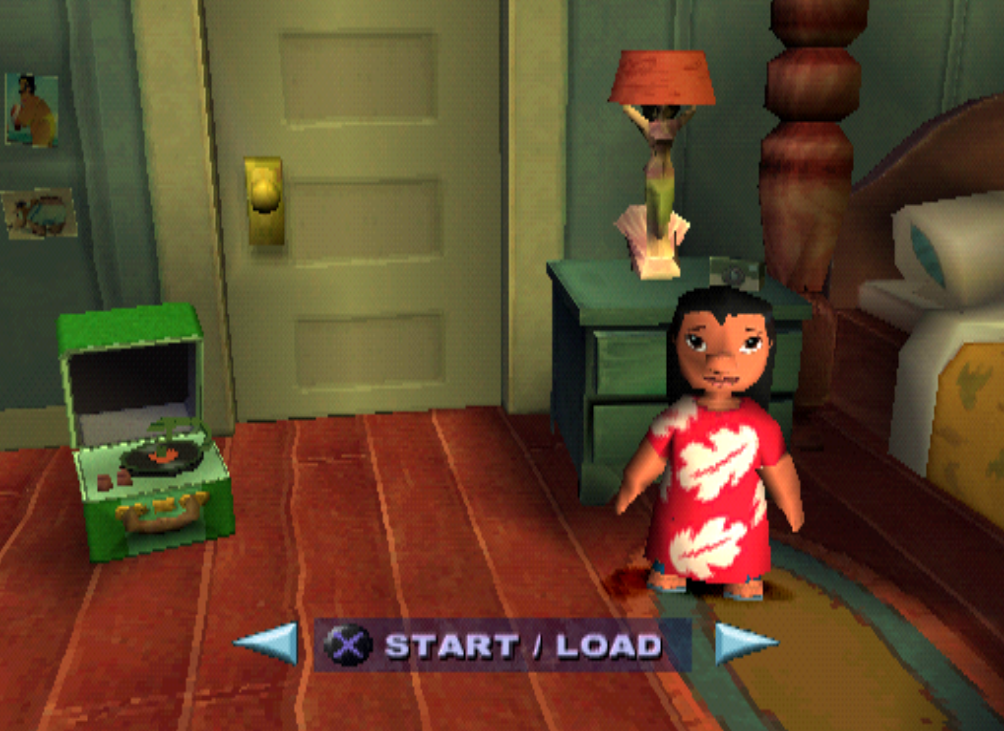LILO & STITCH: TROUBLE IN PARADISE (PS)
While games releasing cross-generation isn’t the strangest occurrence, Sony’s approach to creating Lilo & Stitch adaptations for was fairly unique. The PS2 would receive a prequel titled Experiment 626, while those still standing by their PlayStations in 2002 would get their own entry: Trouble in Paradise, helmed by Blitz Games. Looking back, it’s quite a novelty to see older hardware receiving its own, individually crafted movie tie-in, rather than a scaled back version of the newer system’s game. Sadly, this Crash Bandicoot clone would prove an easy skip. Uneasy controls that make latter levels more difficult than needed, a heinous presentation and very little longevity ensure it doesn’t come close to matching the highs of Disney fare from generations past.
A butchered retelling of the 2002 film that sees an alien creature trying to fit in with a Hawaiian community, Trouble in Paradise coats 16 levels with a basic re-enactment of the story, as clips are spliced between stages without much care. For example, before a chase sequence with Jumba, the cut-scene prior shows a different setting, aesthetic and context to the level you’re about to play, leaving you more confused than engaged. While getting to see parts of the film is usually a plus (and you can freely replay them in the menu), most will find it adds little to the cinematic component. Fans of the film may still get a kick out of seeing these, and collectible movie stills might prove enticing.
You don't have to travel far in Trouble in Paradise to see the Crash Bandicoot influences
You can quickly see the inspiration behind Trouble in Paradise: a 3D platformer that takes place on narrow paths as you jump over hazards, combat enemies which block the path and collect key items along the way. Sometimes, stages turn the camera into a 2.5D affair and certain segments see you being chased by a foe, as you attempt to outrun them while anticipating hazards out of view in front, else it’s an instant-fail. Encounters with certain boss-style characters see you outrunning a bully on a bike and a couple of the aliens looking to capture Stitch. A first glance paints the platforming as inoffensive if generic, with stages that feel uninteresting and lack the dynamism of Crash and even the opening stage bears an uncanny resemblance to levels from Naughty Dog’s mascot platformer. That said, it won’t cause you to tear your hair out too much, and in fact proves quite an easy run.
Things start going downhill, though, once more challenge is gradually added. This exposes the big issue with Trouble in Paradise: both characters suffer from stiff and sometimes unresponsive controls. You end up playing as both protagonists, and while Stitch isn’t exactly fluid in his movements, Lilo feels even worse, with a poor attack that often misses enemies despite their close proximity and unreliable jumps make normal obstacles feel perilous, in a bad way. The first chase sequence, which sees you outrunning a giant Alien, is an exercise in frustration as pitfalls kill you instantly, and inputs don’t feel responsive enough to allow you quick-reactions to slowly appearing hazards. Jumba’s chase is even worse, with sluggish controls combining with his deadly ray gun making for a huge headache. As trickier jumps and more dangerous foes (including laser-accurate hazard-suit aliens) are added, the controls completely fail under the strain, and you’ll see yourself dropping countless lives over these issues, which proves immensely frustrating. Somehow, this game is as boring as it is frustrating.
Things start going downhill, though, once more challenge is gradually added. This exposes the big issue with Trouble in Paradise: both characters suffer from stiff and sometimes unresponsive controls. You end up playing as both protagonists, and while Stitch isn’t exactly fluid in his movements, Lilo feels even worse, with a poor attack that often misses enemies despite their close proximity and unreliable jumps make normal obstacles feel perilous, in a bad way. The first chase sequence, which sees you outrunning a giant Alien, is an exercise in frustration as pitfalls kill you instantly, and inputs don’t feel responsive enough to allow you quick-reactions to slowly appearing hazards. Jumba’s chase is even worse, with sluggish controls combining with his deadly ray gun making for a huge headache. As trickier jumps and more dangerous foes (including laser-accurate hazard-suit aliens) are added, the controls completely fail under the strain, and you’ll see yourself dropping countless lives over these issues, which proves immensely frustrating. Somehow, this game is as boring as it is frustrating.
Luckily, you can clear this game very quickly. A couple of sittings should suffice, or around five hours if I’m being generous. For some strange reason, each stage is blocked off by a repetitive fight with an elemental golem, all of which use the same attack pattern and see you dodging while aiming to attack their backs. It’s clearly an arbitrary way of extending the experience. While collecting four key items in each stage is mandatory, 100 smaller items can also be found for no tangible reward, other than an extra life. Each stage also contains a Time Trial, all limited to a four-minute timer. This sounds hard, but most stages can be cleared in around 2 minutes, and without prizes to earn from better runs, they are pointless. As mentioned, film clapperboards can be found to unlock Stills in the menu, but these will fail to entice entice any but the most dedicated fans of the film.
Despite releasing late in the PlayStation’s lifecycle, Blitz would produce one ugly looking game. Levels appear painfully bland, textured with some low-res details and poor variation between areas. Models, even the main characters, are woefully lacking in flair or intricate geometry, highlighted awkwardly during unflattering in-engine cut-scenes. Frame rate stutters are an issue sometimes, though it doesn’t affect gameplay much. When Crash Bandicoot 3: Warped (a game from four years prior) looks far better, you know something has gone horribly wrong. The sound isn’t much to write home about either, with a moderately engaging soundtrack that often is buried under poor sound mixing, sparse voicework that is consistently poor and effects which sound tinned.
Despite releasing late in the PlayStation’s lifecycle, Blitz would produce one ugly looking game. Levels appear painfully bland, textured with some low-res details and poor variation between areas. Models, even the main characters, are woefully lacking in flair or intricate geometry, highlighted awkwardly during unflattering in-engine cut-scenes. Frame rate stutters are an issue sometimes, though it doesn’t affect gameplay much. When Crash Bandicoot 3: Warped (a game from four years prior) looks far better, you know something has gone horribly wrong. The sound isn’t much to write home about either, with a moderately engaging soundtrack that often is buried under poor sound mixing, sparse voicework that is consistently poor and effects which sound tinned.
The title screen is iconic of gaming's fifth generation, with household items representing the various options
Lilo & Stitch: Trouble in Paradise is a poor affair: a generic platformer that's sunk by stiff controls, awful visuals and a lack of content. Don’t let the late release fool you, as a myriad of platformers from years prior (including the series Blitz aped so shamelessly) prove far more compelling than this rushed exercise in mediocrity. Fans of the film may get a kick out of the extras, but anyone looking for a Disney platformer that’s on the level of Tarzan or Toy Story 2 will be woefully disappointed.
|
|
VERDICT
"Don’t let the late release fool you: Lilo & Stitch: Trouble in Paradise is a poor affair. A generic platformer weighed down by stiff controls, awful visuals and a lack of content." OVERALL: 4/10 |
PIXEL SECONDS: LILO & STITCH: TROUBLE IN PARADISE (PS)
Trouble in Paradise represents a reasonable slice of fifth generation platforming. From its nifty title screen to some solid Crash Bandicoot-aping platformer action, Lilo & Stitch has sparks of quality. It controls moderately well, looks bright and jolly (although somewhat basic) and it delivers some predictable but diverting platforming action. The game’s greatest problem lies in its lack of ambition, and it wouldn’t be the first film tie-in to have that charge levied against it. Its levels are okay, but their themes and layouts are underdeveloped. You’ll spot the odd cameo from the film, as well as the occasional nice bit of scenery, but generally the environments feel a bit sparse. As with a number of Disney’s other licenses of the period, it’s missing the finery we’d come to expect of the brand. Lilo & Stitch lacks polish and innovation, treading the same path Crash Bandicoot strutted down six years earlier, and dare I say it, Crash did so with more swagger, even then. Despite a surprising degree of challenge at points (a lean supply of lives will keep the player on their toes), Trouble in Paradise can be polished off in a few short sessions and there’s precious little in the way of replay value. Some fun gameplay means Lilo & Stitch makes for an inoffensive platformer, albeit one that’s shouldering enough shortcomings that it can only really be recommended to fans of the genre. [5] – Tom Clare © 2023
Trouble in Paradise represents a reasonable slice of fifth generation platforming. From its nifty title screen to some solid Crash Bandicoot-aping platformer action, Lilo & Stitch has sparks of quality. It controls moderately well, looks bright and jolly (although somewhat basic) and it delivers some predictable but diverting platforming action. The game’s greatest problem lies in its lack of ambition, and it wouldn’t be the first film tie-in to have that charge levied against it. Its levels are okay, but their themes and layouts are underdeveloped. You’ll spot the odd cameo from the film, as well as the occasional nice bit of scenery, but generally the environments feel a bit sparse. As with a number of Disney’s other licenses of the period, it’s missing the finery we’d come to expect of the brand. Lilo & Stitch lacks polish and innovation, treading the same path Crash Bandicoot strutted down six years earlier, and dare I say it, Crash did so with more swagger, even then. Despite a surprising degree of challenge at points (a lean supply of lives will keep the player on their toes), Trouble in Paradise can be polished off in a few short sessions and there’s precious little in the way of replay value. Some fun gameplay means Lilo & Stitch makes for an inoffensive platformer, albeit one that’s shouldering enough shortcomings that it can only really be recommended to fans of the genre. [5] – Tom Clare © 2023
OTHER PLAYSTATION 3D PLATFORMER GAMES REVIEWED
